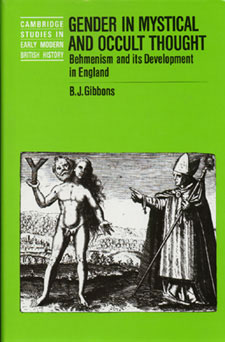|
B.J. Gibbons
Gender in Mystical and Occult Thought:
Behmenism and Its Development in England
Cambridge: Cambridge UP, 1996, 247 pp.
Reviewed by Prof. Arthur Versluis,
Michigan State University
This is a very helpful contribution to a long-overlooked field. In this book, Gibbons discusses the history of Böhmenist theosophy in England, focussing on the mid-seventeenth century, and concentrating on the subject of gender. Gibbons, clearly erudite, has read a great many of the source works from the period, and provides a helpful overview of the period with remarks on many of the primary figures in English esotericism of the day. He also attempts to place English Böhmenist thought not only in historical context, but also in relation to contemporary feminism, determining in the end that although English Böhmenism had a number of prominent women figures including Jane Leade, the most well known, although it prominently featured the androgyne in its anthropology, and although it centered on the feminine figure of Wisdom, still somehow it comes out as more or less "patriarchal." Somehow, on this point one remains unconvinced.
The primary use of this book lies in its direct discussions of major English theosophic figures and their works. These will be of use in introducing other scholars to this field, and because in general Gibbons stays close to the texts themselves, his remarks about them are often helpful. It is good to see Richard Roach and Francis Lee represented here, as well as the somewhat more well known figures of John Pordage and Jane Leade. But so fertile is this field, and so little examined, that one wishes Gibbons had stayed closer to these primary theosophic figures and not strayed into related |
|

